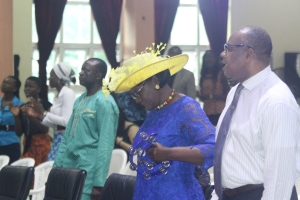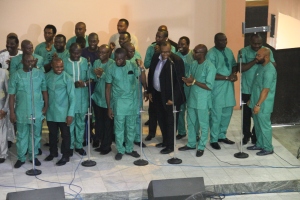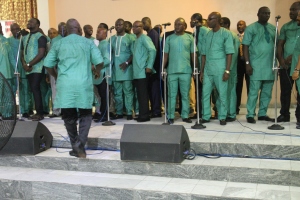Sunday 18 October 2015
Speaker: Pastor Don Woke
Each of these living beings had six wings, and their wings were covered all over with eyes, inside and out. Day after day and night after night they keep on saying,
“Holy, holy, holy is the Lord God, the Almighty—
the one who always was, who is, and who is still to come.”
9 Whenever the living beings give glory and honor and thanks to the one sitting on the throne (the one who lives forever and ever), 10 the twenty- four elders fall down and worship the one sitting on the throne (the one who lives forever and ever). And they lay their crowns before the throne and say,
11 “You are worthy, O Lord our God,
to receive glory and honor and power.
For you created all things, and they exist because you created what you pleased.” Revelation 4:8-11
Dr Jack Hayford, unarguably one of the most respected Charismatic leaders in the world today, received inspiration for the Song ‘Worship His Majesty’ in 1977 while on vacation in Britain. Whilst he was there he observed all the pomp surrounding the celebration of Queen Elizabeth’s 25th year as the Queen of England. He saw the symbols of royalty everywhere he went and imagined how special the people must feel belonging to such a kingdom. He then reflected on the Lord Jesus Christ and realised that His Majesty transcends kingdoms, thrones, and that He will rule throughout all generations. He concluded that Christians are indeed a privileged people to belong to this great King.
WORSHIP
The word Worship evolved from an older word ‘Worth-ship‘. It means to ascribe worth or value to. When it is Almighty God then we ascribe supreme value or worth to Him. Moses said “…Ascribe greatness to our God.” (Deuteronomy 32:3). It therefore follows that the quality of worship we give is determined by the value or worth we place on God. The Psalmist said “Give unto the Lord the glory due to His name; worship the Lord in the beauty of holiness.” (Psalms 29:2). Worship then is declaring in thought, word or action the greatness of God in surrender and submission to Him.
Jesus was clear and unequivocal about whom we should worship: “…For it is written, ‘You shall worship the Lord your God, and Him only you shall serve.” (Matthew 4:10). Worship is about God and not us. He is both the subject and object of worship – worship is both about Him and is directed towards Him. It is not just something that happens on Sunday morning but should be the lifestyle of every believer. It can be individual worship (1 Timothy 2:8) or corporate worship (Matthew 18:20).
MAJESTY
Webster defines majesty as “The dignity and authority of sovereign power; quality or state which inspires awe or reverence.” This was how Daniel described majesty: “O king, the Most High God gave Nebuchadnezzar your father a kingdom and majesty, glory and honor. 19 And because of the majesty that He gave him, all peoples, nations, and languages trembled and feared before him. Whomever he wished, he executed; whomever he wished, he kept alive; whomever he wished, he set up; and whomever he wished, he put down.” (Daniel 5:18-19). Also, “Surely the kingʼs authority is absolute;
no one can say to him, “What are you doing?” (Ecclesiastes 8:4 NET). God is a great King (Malachi 1:14). David understood the Majesty of God and spoke a lot about it (1 Chronicles 29:10-12. See Psalm 47; 96).
It was this Majesty that Isaiah encountered when he saw the Lord “high and lifted up.” (Isaiah 6:1-4). Isaiah subsequently wrote about God’s Majesty (Isaiah 40:9-23; 57:15). Paul, describing the Majesty of God said: “which He will manifest in His own time, He who is the blessed and only Potentate, the King of kings and Lord of lords, 16 who alone has immortality, dwelling in unapproachable light, whom no man has seen or can see, to whom be honor and everlasting power. Amen.” (1 Timothy 6:15-16)
WORSHIPING HIS MAJESTY
The Book of Revelation is useful for eschatology but it also reveals God and how He is to be worshiped. We see in Revelation that Worship is both a delight and the pre-occupation of Heaven. God is the centre of worship; it is always about Him and to Him. Day and night, the heavenly worshipers declare His holiness and Majesty (Revelation 4:8)
CAUSE FOR WORSHIP
True worship is borne out of a proper conception of who God is, that is, His nature and Majesty. Worship is our response to God when His character or nature or presence is revealed to us. God’s essential nature is holiness. The cry: “holy, holy, holy is the Lord” is to emphasis the intensity of God’s holiness. The Seraphim had to cover their feet and their faces to shield them from the intensity of God’s holiness and glory (Isaiah 6:2). When Job encountered God, he could no longer justify himself but confessed, “I have heard of You by the hearing of the ear, but now my eye sees You. 6 Therefore I abhor myself, and repent in dust and ashes.” (Job 42:5-6). Apostle John, who said he was the ‘disciple whom Jesus loved,’ and had leaned on Him during the Last Super, when he encountered the risen Christ in His heavenly splendor said “And when I saw Him, I fell at His feet as dead.” (Revelation 1:17A). His presence was overwhelming and his appearance was beyond description.
Worship also arose from the revelation of God’s power. The saints in heaven declare “Alleluia! For the Lord God Omnipotent reigns! (Revelation 19:6). Creation proclaims the Omnipotence of God. “The heavens declare the glory of God; and the firmament shows His handiwork. 2 Day unto day utters speech, and night unto night reveals knowledge.” (Psalm 19:1-2). Who would observe great sights like mountains, hills, mighty oceans, the deep forests and not wonder at the One who created them? When we think of the sun, the moon, the stars and the galaxies we are awed by the One who created and maintains such wonders.
When the saints reflected upon God’s work throughout history, particularly His redemptive works, it evoked worship. “And they sang a new song, saying: “You are worthy to take the scroll, and to open its seals; For You were slain, and have redeemed us to God by Your blood out of every tribe and tongue and people and nation.” (Revelation 5:8. Also see Revelation 15:3-4). When we consider the privilege we have because of our redemption, worship should be our reasonable response. (Romans.12:1 NLT).
Another cause for worship was realizing God’s purpose for mankind. The elders captured this essence when they sang: “You are worthy, our Lord and God,
to receive glory and honor and power, since you created all things,
and because of your will they existed and were created!” (Revelation 4:11 NET).
As we reflect on the purpose of man, we know it is to worship. (Revelation 4:11). God created what He wanted and they exist for His pleasure, that is, to worship Him. The dead cannot praise Him. We must justify our being alive by rendering worship to God. Worship is our way of acknowledging and appreciating God’s role and rule in our lives: “Oh come, let us worship and bow down; Let us kneel before the Lord our Maker.” (Psalm 95:6. Also see Psalm 100). The Westminster Catechism (shorter version) begins with the question: “What is the chief end of man?” And provides the answer: “Man’s chief end is to glorify God, and to enjoy Him forever.”
EXPRESSION OF WORSHIP
We observe that worship in heaven is both intense and passionate in expression. It is neither casual nor lackadaisical. There is a required protocol even before earthly kings. Those who come from certain parts of Nigeria may probably not understand the ways of royalty as others do. For instance, the Yorubas know that you cannot come into the presence of royalty and remain indifferent. When an Oba shows up and you remain standing you might get a ‘rough tackle’ from the palace guards. If that is true for an earthly, transient king, how much more for our great and eternal King, One who has been described as “The Sovereign Monarch of the Universe!” Access to God should not be taken for granted. We can’t be casual when we are in His presence, and there should be no room for irreverence.
Generally, it is true that response in the place of worship depends on the personality of the worshipper. While some will stand and raise their hands, others may kneel or lie prostrate before the Lord. Some would express their worship with tears while others would dance. We must respond to God anyhow, despite our different personalities. When the heart is fully engaged, emotions will naturally run freely.
Each of these responses demonstrates surrender and dependence. We are saying to God: “You are higher than I am; You can do for me what I can’t do for myself.” When it comes to worship a person’s status is insignificant because we are before the Most High God – and you can’t get higher than that!
That is why these highly elevated twenty-four elders fall down before God in humility in response to the worship song raised by the four living beings. They were not conscious about their dignity. They realized that anything they are or have is from the Lord. When one is preoccupied with God there is no room for self-consciousness. As we appreciate God’s awesomeness, we can’t but worship.
Unfortunately, some people allow their false sense of dignity to stop them from responding to God in worship.
David was a man who recognized that God made him and had arranged the circumstances that brought about his lifting. He did not allow the dignity of his position or office stop him from worshipping God. The Psalms reveal how lavish David was in his worship. He knew how to dance before God. When Michal, David’s wife, reproved him for dancing before God in a manner unbecoming of royalty, this was David’s response: “David replied to Michal, “In God ‘s presence I’ll dance all I want! He chose me over your father and the rest of our family and made me prince over God’ s people, over Israel. Oh yes, I’ll dance to God ‘s glory 22 ––more recklessly even than this. And as far as I’m concerned… I’ll gladly look like a fool… but among these maids you’re so worried about, I’ll be honored no end.”” (2 Samuel 6:21-22 MSG). David considered his status insignificant when compared to Almighty God (2 Samuel 7:18).
Worship also involves laying down our all at His feet, recognising that whatever we have is a gift from Him. He created it all so He is worthy to receive it all. The twenty-four elders lay down their crowns at His feet to acknowledge that whatever they achieved has come from God. And if we have attained any height or achieved anything in life, we must also recognise that God granted us opportunities; we must realise how different our circumstances could have been if not for God’s help.
THE EFFECT OF WORSHIP
Still speaking about the song, Worship His Majesty, Dr Jack Hayford said that “Majesty’ is also a statement of the fact that our worship, when begotten in truth, can align us with His Throne in such a way that His Kingdom authority flows to us – to overflow us, free us, and channel through us.” What a great privilege then to be a worshipper.
There is a divine exchange that takes place in the context of worship. No one who has genuinely worshipped and encountered the presence of the living God leaves the same way. After Moses had spent time in the presence of God his countenance bore the evidence (Exodus 34:29). The Psalmist captured what happens in God’s presence this way: “You will show me the path that leads to life; your presence fills me with joy and brings me pleasure forever.” (Psalm 16:11 GNT). In His presence power flows out to meet needs and roll away burdens (Psalm 30:6; Isaiah 61:3).
When the heart is fully engaged, there is an intensity in the place of worship that attracts God’s presence, that brings down the glory, that invites Him into the circumstances of your life (2 Chronicles 5:13-14; 2 Chronicles 20:22). God inhabits the praises of his people (Psalm 22:3 KJV). When God comes, He never comes empty handed. He comes with gifts and answers.
It is also a fact that the person you worship is the person you empower over your life. The one you worship is the one that will show up for you when you are in difficulty. When the three Hebrew boys refused to bow to Babylonian idols because they worshiped the living God, Yahweh showed up on their behalf (Daniel 3:16-18).
Someone noted that “worship is in the DNA of the human heart.” So, if you don’t worship God then you will worship something or someone else. What is your choice? Worship is acceptable only when Jesus is the centre of your life. He is the way, the truth and the life (John 14:6).
















